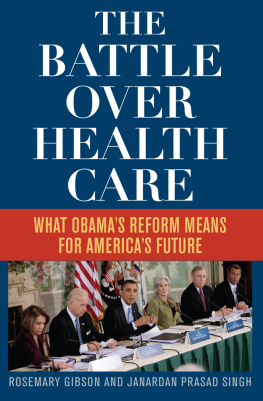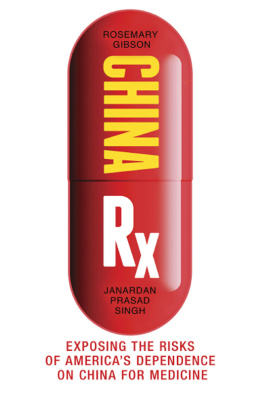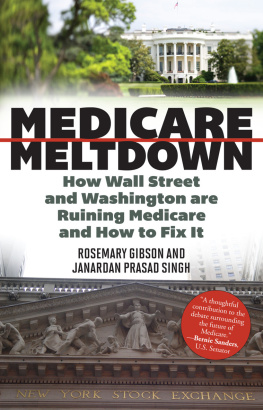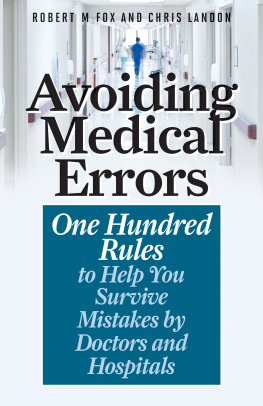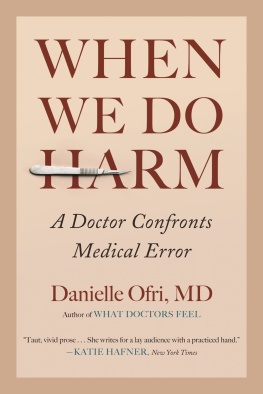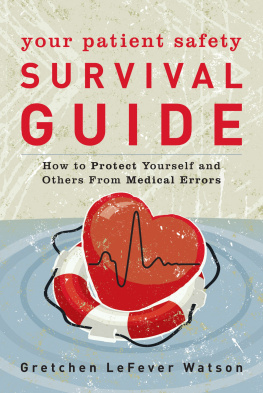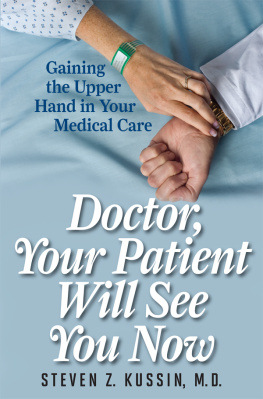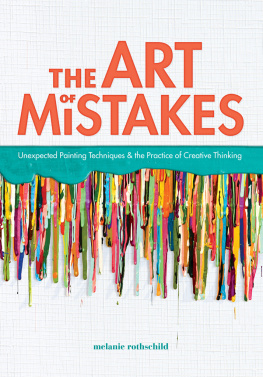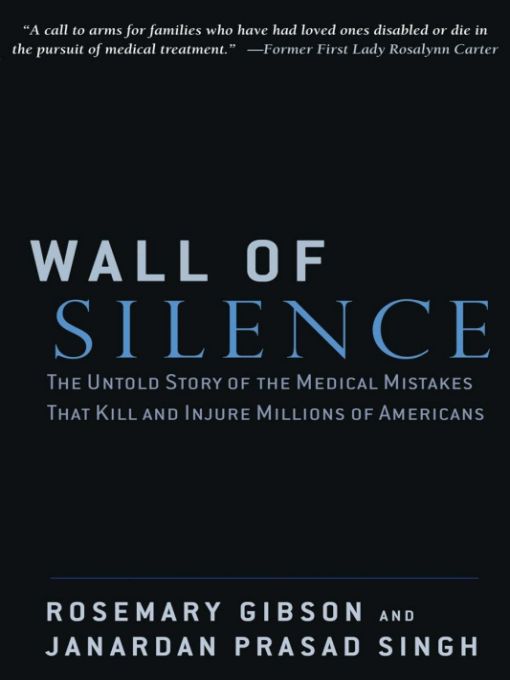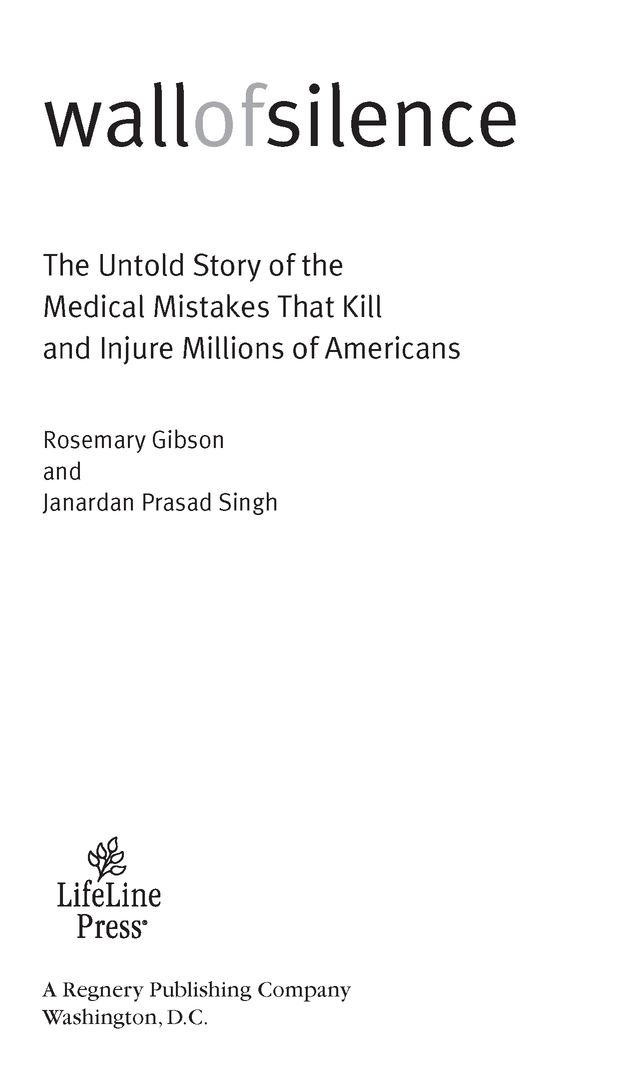Table of Contents
Praise for Wall of Silence
Gibson and Singh provide a call to arms for families who have had loved ones disabled or die in the pursuit of medical treatment.... Well written and researched, [Wall of Silence] highlights this timely topic in a unique way that will evoke the readers own experiences. Former First Lady Rosalynn Carter
The tragic accounts gathered here... are a warning. They remind us of the importance of being careful and alert, whatever we do, of the need to help wherever we can, and, where we cannot, at least to prevent harm. Real care of the sick does not begin with costly procedures, but with the cultivation of a kind heart.
His Holiness the Dalai Lama
Every patient needs to read this book.
Ellen Stovall, Executive Director,
National Coalition for Cancer Survivorship
Exciting! Tremendous that Wall of Silence has been written. The horror stories have to be told.
James E. Burke, Former Chairman
and CEO, Johnson & Johnson
Timely and extraordinary... The authors portray riveting stories of medical errors and what needs to be done to solve this vexing problem. A must-read for patients and families on how they can protect themselves.
The Honorable Thomas Kean,
Former Governor, State of New Jersey
Wall of Silence does something no one else has donetell the real stories of medical errors.
Gail Warden, CEO, Henry Ford Health System
Former Chairman, American Hospital Association
In a clear and eloquent voice, Wall of Silence reinforces an issue that the health care system has not wanted to address.
James A. Block, M.D., Former CEO,
Johns Hopkins Health System
Wall of Silence does a really terrific job of putting a face on the statistics regarding medical error.... [D]emonstrates many of the different ways this serious problem is manifest throughout the health care system. Bill Novelli, CEO, AARP
This very readable and comprehensive book puts medical errors in a compelling human context. The lay reader will better understand the complex underlying issues that affect mistakes being made, but also will better understand the human toll.
William C. Richardson, President and CEO,
W.K. Kellogg Foundation, Chair, Institute of Medicine
Committee on Quality of Health Care in America
Wall of Silence should be required reading for every American who uses, or is a potential user of, the health care system.... [W]ithout placing unfair blame on dedicated health providers, the authors alert us to this major and complex problem. Most important, it empowers each of us to guard against being a victim by being an educated consumer.... Wall of Silence will serve as a wake-up call for each of us.
Rheba de Tornyay, R.N., Ed.D., Dean Emeritus,
University of Washington School of Nursing
... a repository of information and a set of clear opportunities for safety that the public can use.
Geraldine Bednash, R.N., Ph.D., F.A.A.N., Executive Director,
American Association of Colleges of Nursing
This is a book that should interest all Americans, as we are all affected by the health care system. With an array of examples that are revealing and sometimes shocking, the authors clearly illustrate many of the systemic problems that need addressing and offer some pragmatic steps that the public and health care professionals can take to enhance the reliability of care.
The Honorable Matthew F. McHugh,
Former Congressman from New York
A compelling story of what the public needs to be concerned about.
William Roper, M.D., M.P.H., Dean, School of Public Health,
University of North Carolina at Chapel Hill,
Former Director, Centers for Disease Control
Former Administrator, Health Care Financing Administration
Former White House health care advisor
Gibson and Singh have moved beyond statistics, or system terminology, to put the human face, and story, in front of us. Nurses, doctors, pharmacists, patients, and families want care to be safer, and Wall of Silence illustrates how that can be done.
Mary Foley, M.S., R.N., Past President,
American Nurses Association
The harrowing stories by patients and their familiesand physiciansreveal an urgent need for sweeping changes in the culture of medicine. Gibson and Singh speak to the necessary review of physicians efforts toward patient care.
Eric J. Hodgson, M.D., National President 2002-2003,
American Medical Student Association
Im so happy that Gibson and Singh have given voice to those of us who have suffered at the hands of this broken and greed-driven health care industry.
Kay McVay, R.N., President, California Nurses Association
To those who shared their stories
and to those whose stories remain untold
Acknowledgments
This book would not have been possible without the courage and determination of the people who graciously shared their experiences with medical error that changed them forever. There are no words to express our heartfelt appreciation to them for allowing us into their lives in the aftermath of error, in all its anguish and devastation. If we have accomplished nothing else with this book, we hope it gives voice to the silent suffering they and many others have sustained. Our fervent wish is that we have done justice to their sorrow and their hope for a better tomorrow.
We are grateful to Ilene Corina and Jennifer Dingman, who introduced us to the vast network of people all across America who have borne the consequences of medical mistakes. Lennie and Ed Duensing shared their enthusiasm, hospitality, and encouragement while we wrote this book. For his unerring faith in this endeavor from the very beginning, we are indebted to Gail Warden. Those who patiently waded through various drafts have our heartfelt thanksBernice Harper, Booker Woods, Larry and Lois Jassie, Yiota Souras, Jean Johnson, Ranjan Dwivedi, Nisha Singh, and Sarveshwari Singh. Joseph Alper helped turn an early draft into compelling narrative. Kathy Flatley and Mary Beth Kren shared the fruit of their expertise as searchers of valuable information. Susan Leisentritt made scraps of paper into something readable with precision and care.
Marji Ross, Molly Mullen, and Mike Ward at LifeLine Press understood the importance and timeliness of the message of this book, and we shall remain ever grateful to them. They had faith in this work and wisely encouraged us to put a human face on a profound national problem that deserves urgent resolve and resolution.
Finally, we render our humble and profoundest regard to the one who inspired this book and who has made itand so much elsepossible.
Preface
For several years, we cared for a beloved friend who had a life-threatening medical condition. He received the best care the U.S. health system had to offer. It prolonged his life, and we are profoundly and eternally grateful to the many doctors, nurses, and others who cared for him. But what the health care system gave with one hand, it took away with the other. He died because of medical error.


